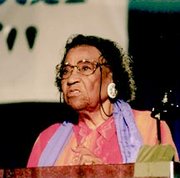Amelia Boynton Robinson
|
|
Template:LaRouche Amelia Platts Boynton Robinson (born 1911) was a figure in the American Civil Rights Movement and later became a leader in the Lyndon LaRouche-related Schiller Institute.
Born in Georgia, she became involved as a young woman in campaigning for women's suffrage. She and her husband, Bill Boynton, knew George Washington Carver at the Tuskegee Institute. In 1934 she registered to vote, a privilege which later became a right. A few years later she wrote a play, "Through the Years", which told the story of creation of Spritual music, in order to help fund a community center in Selma, Alabama. The Robinsons met Reverend Martin Luther King Jr. and Coretta Scott King in 1954 at the Dexter Avenue Baptist Church in Montgomery, Alabama, where King was the pastor.
In 1963 Bill Boynton died. Amelia Robinson's home and office in Selma became the center of Selma's civil rights battles, used by King and his lieutenants, by Congressmen and attorneys from around the nation, to plan the demonstrations known as the "Selma to Montgomery marches". One of them, held March 7, 1965, became known as Bloody Sunday. Robinson was among the marchers tear-gassed and beaten by Alabama State Troopers. The horror of that event helped lead to the passage of the Voting Rights Act of 1965. Robinson was a guest of honor when President Lyndon Johnson signed the Voting Rights Act into law.
Robinson ran for the Congress from Alabama in 1964, the first female African-American ever to do so and the first female of any race to run for the ticket of the Democratic Party in Alabama. She received 10% of the vote.
Robinson was awarded the Martin Luther King, Jr. Foundation Medal of Freedom on July 21, 1990, by the New York State Martin Luther King, Jr. Foundation. In the preface to her autobiography, Bridge Across Jordan (see references), there are many tributes from friends and colleagues, including J.L. Chestnut, Jr. (author, Black in Selma), Coretta Scott King, and Andrew Young
Robinson met Lyndon LaRouche in 1983 and a year later served as a founding board member of the Schiller Institute. She is now the Vice Chair of the Institute, which she says is "following in the footsteps of Martin Luther King", according to the Schiller Institute website.
In 2004 Robinson sued The Walt Disney Company for defamation, asking for between $1 and $10 million in damages. She contended that the 1999 TV movie "Selma, Lord, Selma", a docudrama based on a book written by two young participants in Bloody Sunday, falsely depicted her as a stereotypical "black Mammy" whose key role was to "make religious utterances and to participate in singing spirituals and protest songs." She lost the case. [1] (http://www.al.com/search/index.ssf?/base/news/110103250062210.xml?birminghamnews?nmet) [2] (http://www.mgt.smsu.edu/em/profiles/Special%20Events%20Manager.htm)[3] (http://www.lfwlaw.com/news-events/story.cfm?id=22)
References
- Robinson, Amelia Boynton: Bridge Across Jordan, 2nd ed., Schiller Institute, 1991. ISBN 0962109541, Library of Congress Catalog Number 90-62730
- Civil rights hero loses $1 million suit over film (http://www.al.com/search/index.ssf?/base/news/110103250062210.xml?birminghamnews?nmet) by Chanda Temple, The Birmingham News, November 21, 2004
- Amelia Boynton Robinson biography (http://www.schillerinstitute.org/biographys/bio_amelia_new.html) from the Schiller Institute
External links
- Schiller Institute: Tribute to Amelia Boynton Robinson (http://www.schillerinstitute.org/conf-iclc/2001/Labor%20Day/conf_sep_2001_mw_.html#mw)

